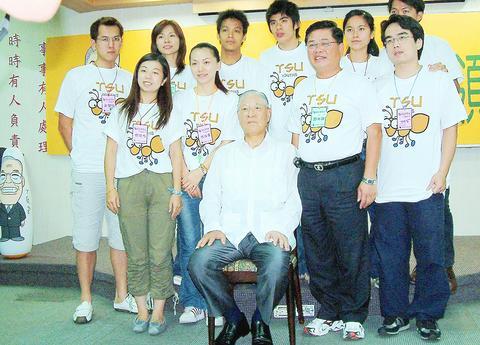Further economic integration between Taiwan and China would not benefit Taiwan, former President Lee Teng-hui (李登輝) said yesterday.
Speaking at a seminar for young people organized by the TSU, Lee said that basic economic theory suggested that a closer relationship with China would be detrimental to Taiwan.
As the two economies integrate, Lee said, there would an equalization between the factors of production -- land, labor, capital, brainpower, etc. -- and prices.

PHOTO: CNA
"If we keep strengthening the economic ties and integration between Taiwan and China," Lee said, "real-estate prices, interest rates and salary levels in this nation will slump and finally fall to the same level as China's."
With his young audience in mind, Lee said: "With more and more Chinese university graduates and workers flooding into Taiwan, it would be harder and harder for you to find a job."
He also pointed to the examples of Germany and Hong Kong, both of which have experienced severe economic problems in the wake of unification.
"Those who support the so-called `common market' concept are stupid people in my eyes," Lee said.
Further economic integration would in fact only benefit those businessmen with interests in China, Lee said. "However, the majority of the workforce, including farmers, white-collar workers, blue-collar workers, soldiers, teachers and civil servants would not get a dime," he said.
"The middle class is the stabilizing power in Taiwan. Nothing can be done if you don't look after them," Lee said, "because it is they who tend to defend values of democracy and freedom, which are the core values of Taiwan."
Lee asked the students participating in the seminar to mull over "meaning of the existence of Taiwan's subjectivity."
"Although we are of different generations," Lee told his audience, "we all have to face the same threats from China together. So you must learn how to resist bravely the political, economic, psychological and military threats from China, and learn not to surrender to Chinese hegemony because of its pressure."
Citing Abraham Lincoln's speech that a nation could not be both "half slave and half free," Lee described Beijing's "one country, two systems" concept as evil..
"It denies the given rights of Taiwanese to choose their future for themselves. The concept not only threatens people in Taiwan, but others elsewhere as well," Lee said.
"Some people in Taiwan have been infected with the `one-China' virus, and they indulge in wishful thinking that, if we concede to China politically, there will be peace. But ... peace will not come. Pre-World War II Europe is the best example to show that appeasement only brings war. it shows an aggressor that threats work," he said.
"In [the Old Testament book of] Exodus, the Israelites complained to Moses that the escape from Egypt only brought pain and turbulence. They asked to go back to Egypt," said Lee. "But should we go back and live a life of slavery?" he said.

FALSE DOCUMENTS? Actor William Liao said he was ‘voluntarily cooperating’ with police after a suspect was accused of helping to produce false medical certificates Police yesterday questioned at least six entertainers amid allegations of evasion of compulsory military service, with Lee Chuan (李銓), a member of boy band Choc7 (超克7), and actor Daniel Chen (陳大天) among those summoned. The New Taipei City District Prosecutors’ Office in January launched an investigation into a group that was allegedly helping men dodge compulsory military service using falsified medical documents. Actor Darren Wang (王大陸) has been accused of being one of the group’s clients. As the investigation expanded, investigators at New Taipei City’s Yonghe Precinct said that other entertainers commissioned the group to obtain false documents. The main suspect, a man surnamed

DEMOGRAPHICS: Robotics is the most promising answer to looming labor woes, the long-term care system and national contingency response, an official said Taiwan is to launch a five-year plan to boost the robotics industry in a bid to address labor shortages stemming from a declining and aging population, the Executive Yuan said yesterday. The government approved the initiative, dubbed the Smart Robotics Industry Promotion Plan, via executive order, senior officials told a post-Cabinet meeting news conference in Taipei. Taiwan’s population decline would strain the economy and the nation’s ability to care for vulnerable and elderly people, said Peter Hong (洪樂文), who heads the National Science and Technology Council’s (NSTC) Department of Engineering and Technologies. Projections show that the proportion of Taiwanese 65 or older would

Democracies must remain united in the face of a shifting geopolitical landscape, former president Tsai Ing-wen (蔡英文) told the Copenhagen Democracy Summit on Tuesday, while emphasizing the importance of Taiwan’s security to the world. “Taiwan’s security is essential to regional stability and to defending democratic values amid mounting authoritarianism,” Tsai said at the annual forum in the Danish capital. Noting a “new geopolitical landscape” in which global trade and security face “uncertainty and unpredictability,” Tsai said that democracies must remain united and be more committed to building up resilience together in the face of challenges. Resilience “allows us to absorb shocks, adapt under

Taiwan Semiconductor Manufacturing Co (TSMC, 台積電) yesterday said it is building nine new advanced wafer manufacturing and packaging factories this year, accelerating its expansion amid strong demand for high-performance computing (HPC) and artificial intelligence (AI) applications. The chipmaker built on average five factories per year from 2021 to last year and three from 2017 to 2020, TSMC vice president of advanced technology and mask engineering T.S. Chang (張宗生) said at the company’s annual technology symposium in Hsinchu City. “We are quickening our pace even faster in 2025. We plan to build nine new factories, including eight wafer fabrication plants and one advanced